
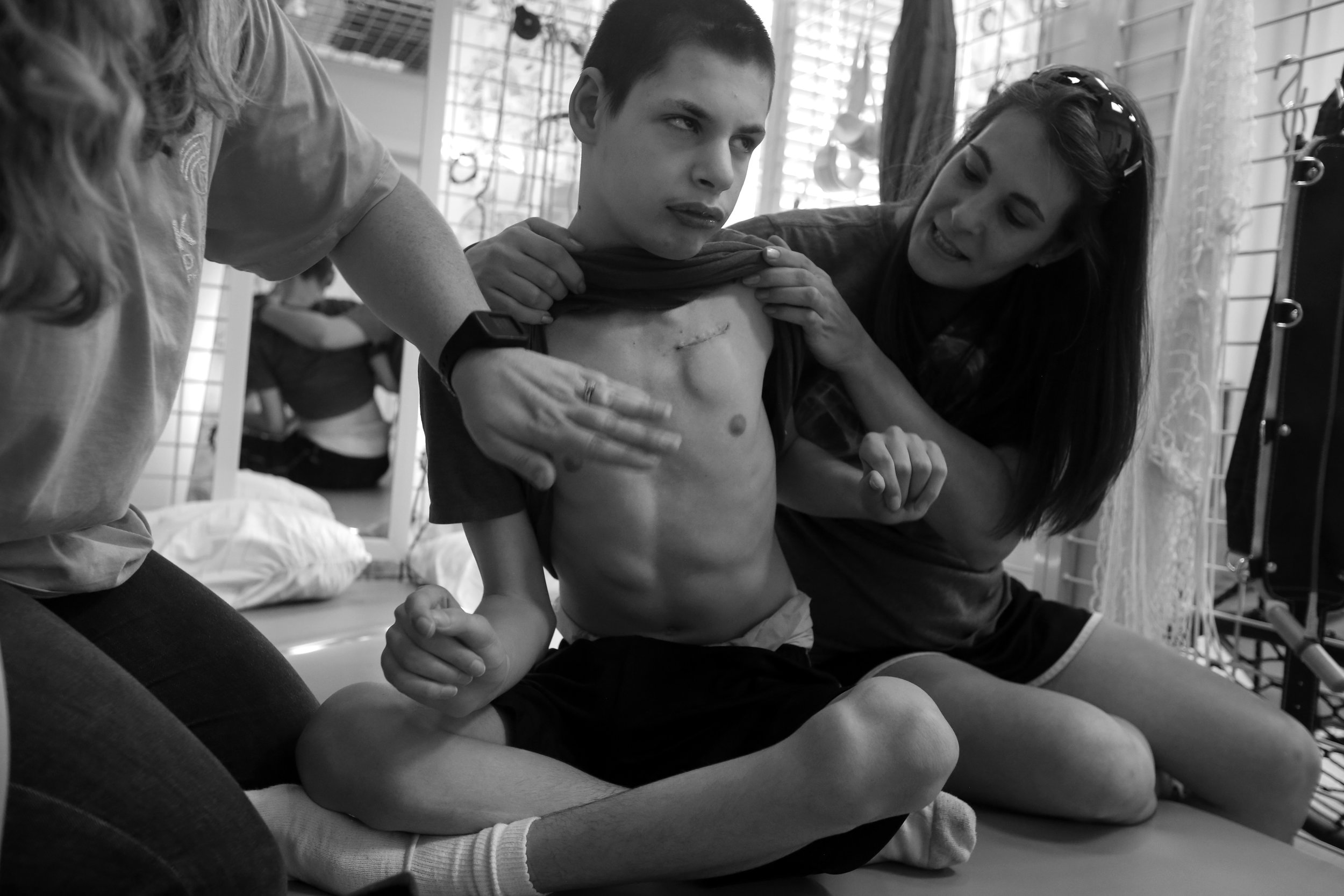

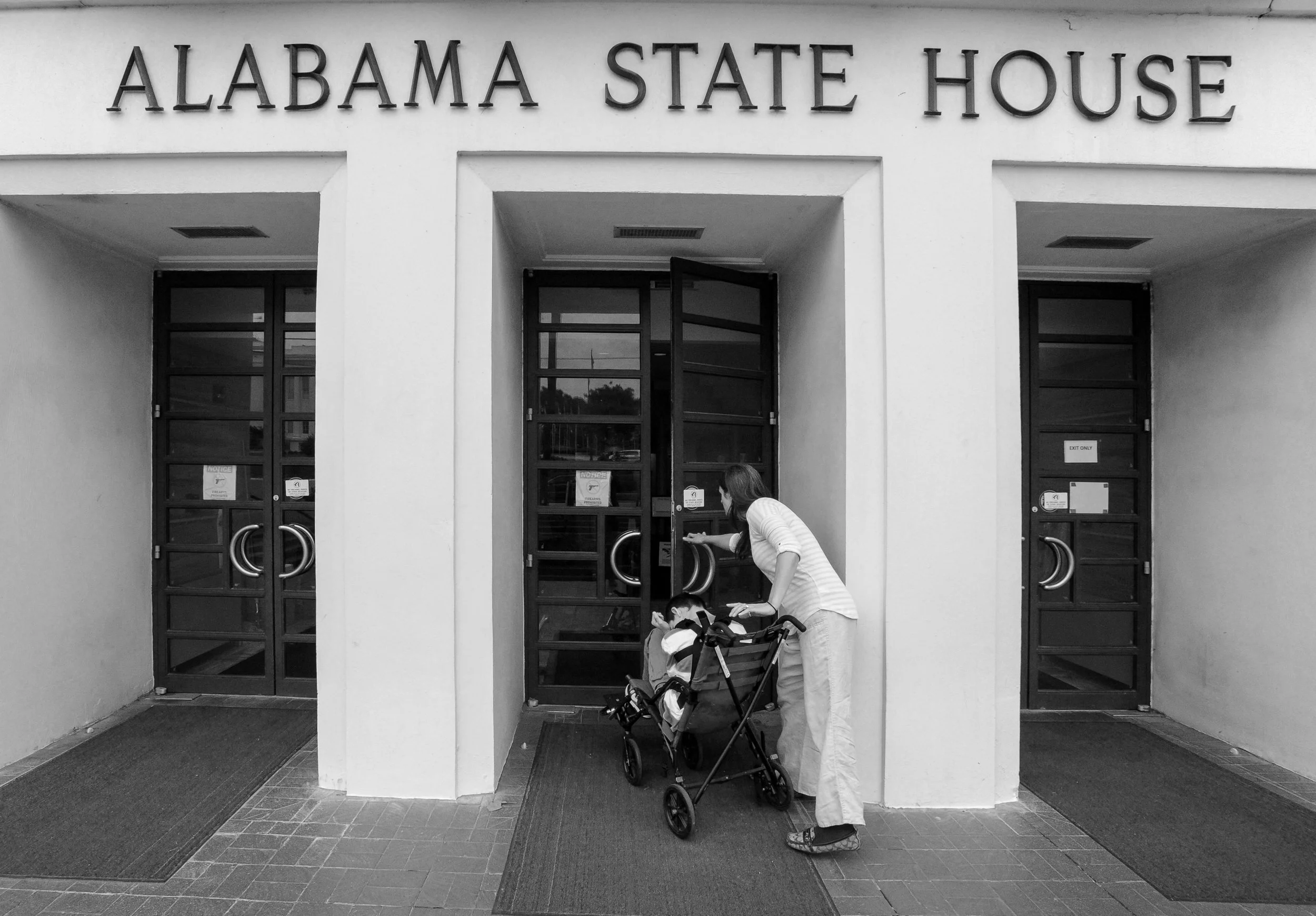

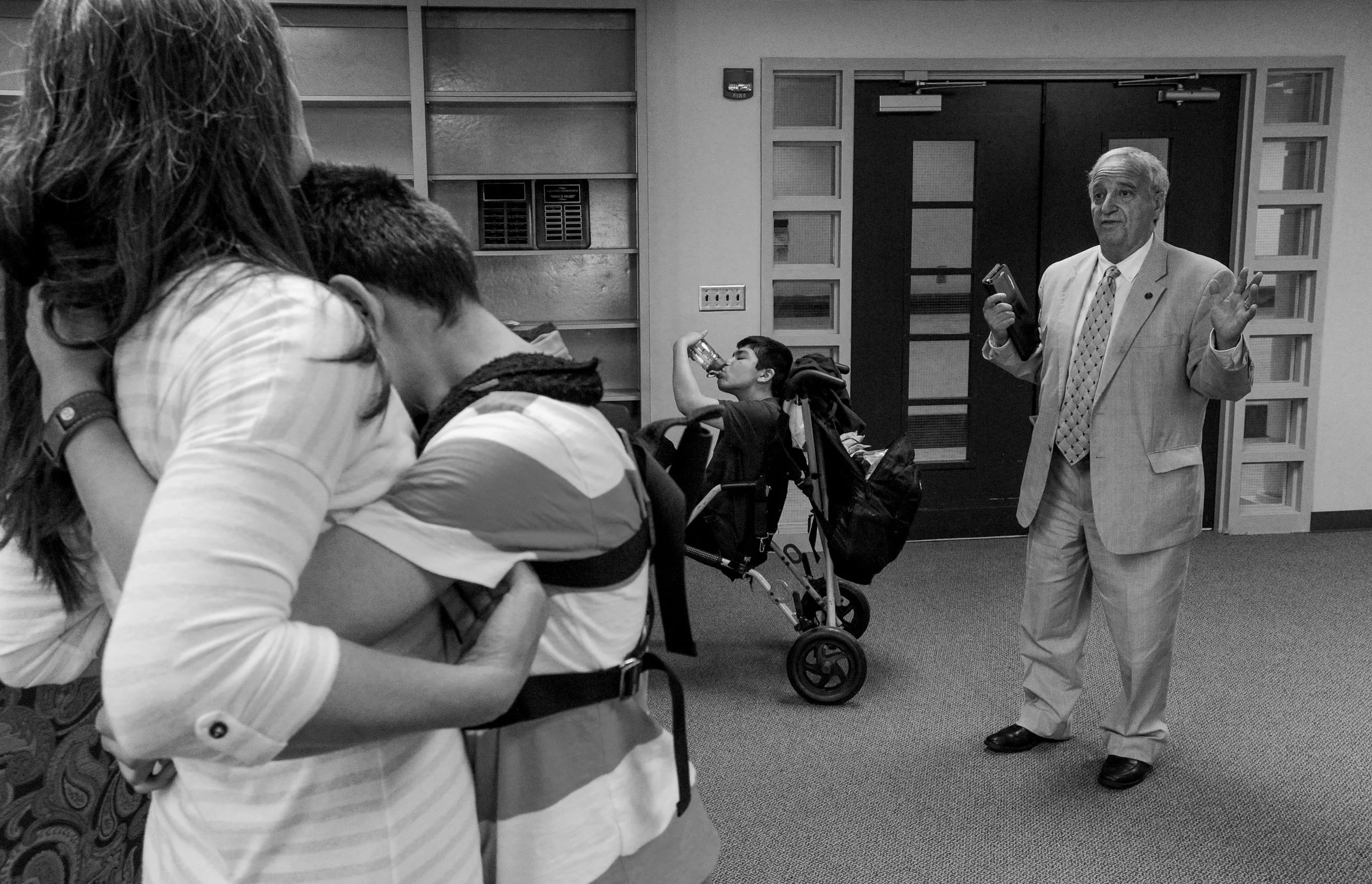


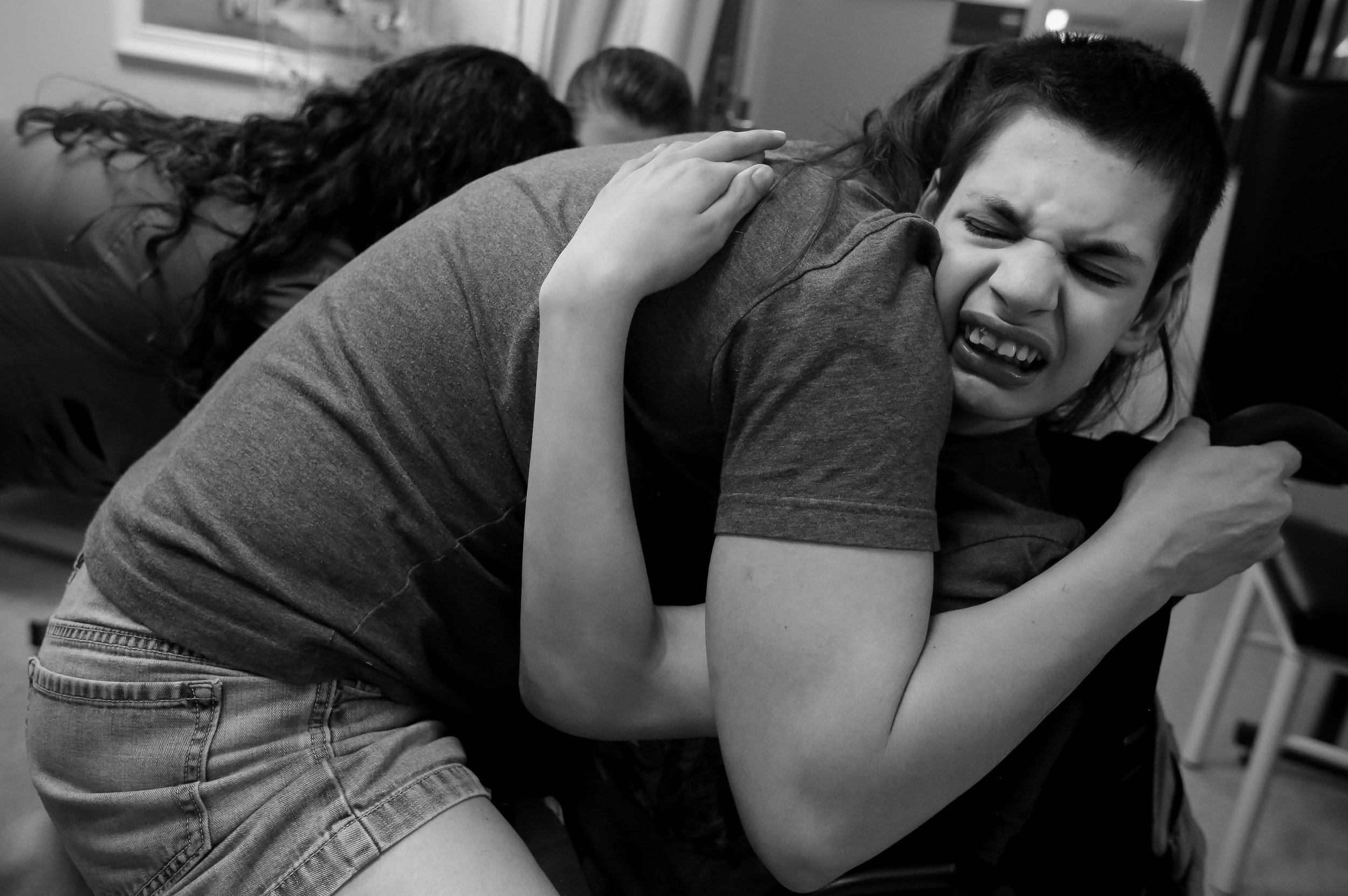

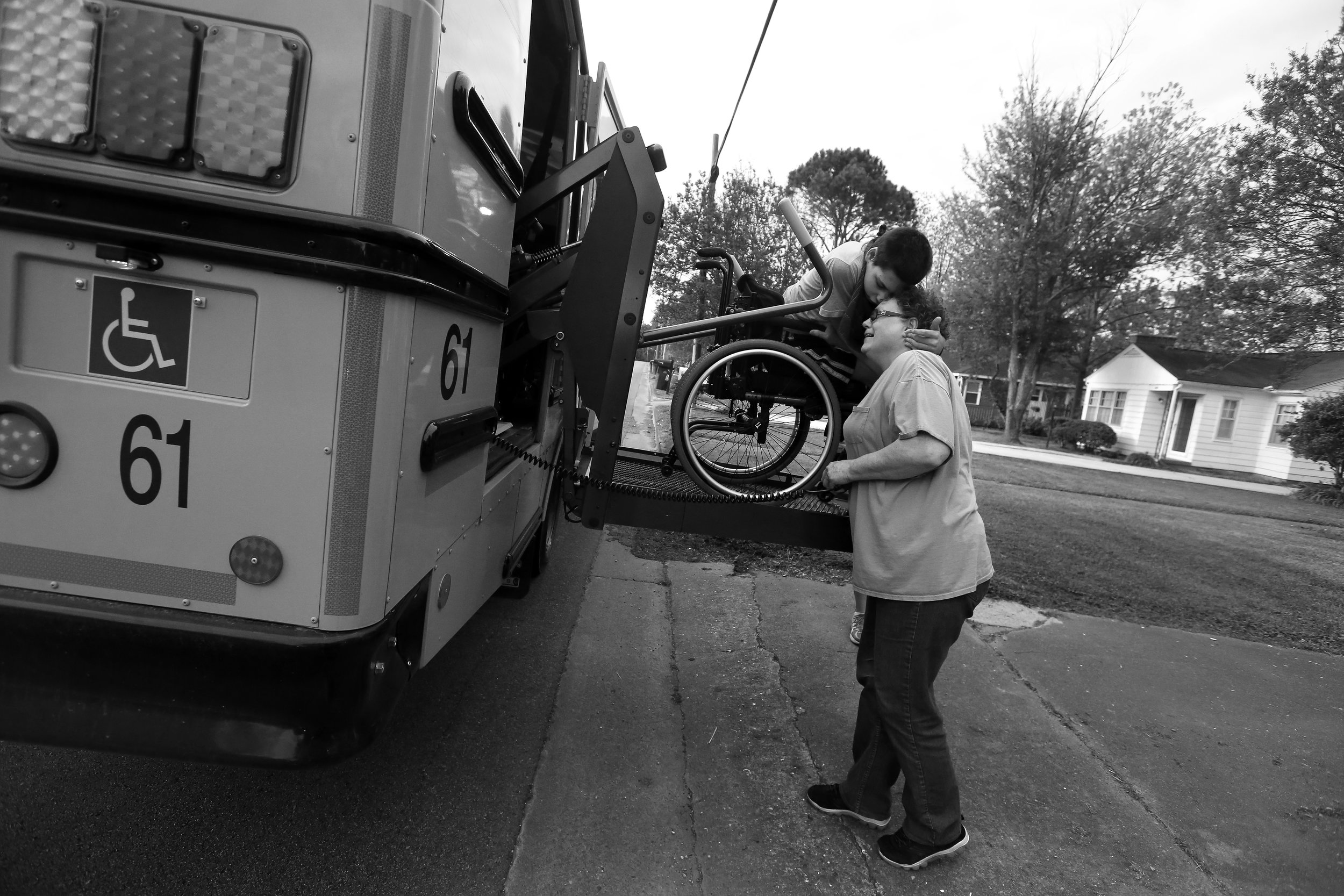



Physical therapist Laura Carroll Witt (left) looks at a scar on Robert Mitchell's chest as his mother, Jody Perkins, holds his shirt at Kale Dement Physical Therapy in Decatur, Ala., on October 31, 2016. Robert, 13, received the scar during his third Vagus Nerve Stimulator (VNS) installment surgery. A VNS device prevents seizures by sending regular, mild pulses of electricity to the brain via the vagus nerve. Robert required the additional surgery because a wire running from the device’s battery to Robert’s vagus nerve was too taut in his neck. For most of his life, the device had been one of the best treatments for Robert's seizures, but in August, 2016, was shut off after cannabis oil proved to be an effective treatment. The surgery was done as a preventive measure in case he needs the device in the future.

Jody Perkins changes her son Robert's diaper in Montgomery, Ala., on April 14, 2016. After Robert was born, he unexpectedly stopped breathing and doctors determined he’d suffered a bilateral stroke in utero. The stroke killed the back half of Robert's corpus callosum, which is a band of nerve fibers joining the two hemispheres of the brain. Four days after he was born, Robert had his first seizure. The stroke caused epilepsy, developmental delays, right side deficiency and partial blindness. At 13-months-old, Robert was diagnosed with Lennox-Gastaut Syndrome, a severe form of epilepsy marked by multiple types of seizures. The syndrome is hard to control with medication.

Jody and Robert enter the Alabama State House on April 14, 2016, in Montgomery. This was the first house vote on Leni's Law in Alabama. The bill would later decriminalize cannabidiol, derived from cannabis, for people meeting certain medical conditions. The bill is named after Leni Young, an Alabama child whose family moved to Oregon to legally use cannabidiol in the treatment of severe seizures.

Rep. Mike Ball, R-Huntsville, (right) talks with Jody Perkins (left) and other families about the first vote on a modified version of Leni's Law at the Alabama State House on April 14, 2016. The original bill allowed anyone with a debilitating medical condition to use oil with up to 3 percent THC, which is the active ingredient in cannabis that gives the user a high. The modified house version allows a person with epilepsy to use oil with up to 1 percent THC. In the photo, Mike Ball reassures a group of families that the modified version is likely to pass the house floor and go before the Senate. The bill, sponsored by Sen. Paul Sanford, R-Huntsville, ultimately passed. The bill was later expanded to include anyone with a debilitating medical condition. Former Gov. Robert Bentley signed the bill into law on May 4, 2016. Proponents of cannabis oil say that 3 percent THC is necessary for the oil to work, but not nearly enough to give the user a high.

Robert and Jody are awake at 2 a.m. on July 9, 2016. Robert hadn't slept for a number of days—a dangerous situation as sleep deprivation leads to additional seizures. Jody is seen restraining Robert for safety reasons. Medication withdrawals and pain associated with Robert’s seizure can keep him awake.

Jody helps Robert get ready for school on April 19, 2016. Since starting cannabis oil, Robert’s seizures have reduced from six types to one. Before cannabis oil, Robert could experience up to 1,000 seizures a day. After being treated with cannabis oil, Jody says he could have anywhere from zero to 50.

Jody pins Robert to a chair during a blood draw at Decatur Morgan Hospital, October 10, 2016. Every three months, doctors test Robert’s blood to monitor his Banzel and Onfi levels. Banzel was the pharmaceutical drug developed for Lennox-Gastaut Syndrome, while Onfi is a benzodiazepine prescribed for seizure patients. Robert has been on Banzel since 2008, but since he began cannabis oil in 2016, doctors have reduced his dosage from 2800 mg to 200 mg. In addition, Robert has been weaned from 30 mg to 10 mg of Onfi. Jody says her son would often go stiff, stop breathing or fall over whenever his Onfi levels dropped. Jody and many of the mothers in her circle call Onfi "Satan" because of the dangerous withdrawal side effects they have witnessed in their children.

Belinda Johnson helps Robert onto the school bus, April 19, 2016. Robert is an eighth-grader at Oak Park Middle School. He’s attended school since the age of 3.

Jody takes a moment to gather herself at the Alabama State House in Montgomery prior to a vote on Leni's Law, April 14, 2016. During the three months the House was in session, Jody, Robert and Jody’s mother-in-law, Ginny (left), drove the six-hour round trip from Decatur to Montgomery two to three times a week. During her visits, Jody frequently met with members of the House and Senate to advocate for the right to use cannabis oil.

Jody Perkins takes a moment to cuddle with Robert on the sofa at their home in Decatur, Ala., June 6, 2016. Jody often says "Robert is my hero," because he is the strongest person she knows. "People like to say Robert is brave. Robert is unique and extraordinary” said Perkins. “But he is not brave because he has no choice about his situation and as long as he doesn't give up, I will not give up."